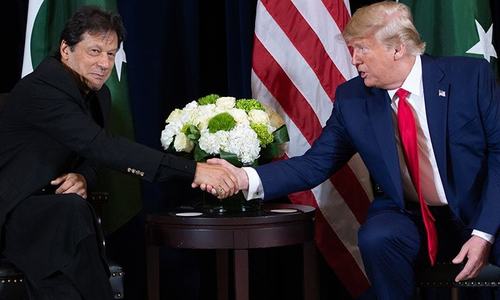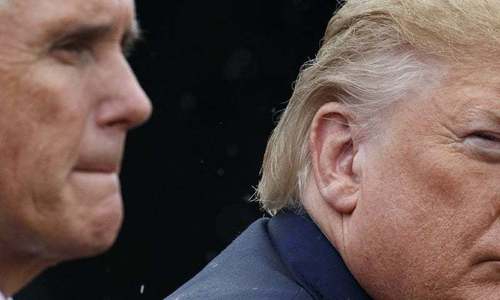CHIEF Special Warfare Operator Edward ‘Eddie’ Gallagher is a man of many sins. According to military prosecutors in the United States, Gallagher is responsible for brutally stabbing and murdering a teenage so-called Islamic State (IS) fighter, using his sniper rifle on ordinary Iraqi citizens, and boasting about racking up his ‘kills’ to others.
To top it all off, Gallagher is also guilty of taking a triumphant photo of himself with the young IS fighter that he killed. Gallagher was tried and convicted by a military court earlier this year, and was to be deprived of his rank and booted out of the US Navy SEALs.
President Donald Trump could not tolerate this. Despite having been told by top military and defence officials that he should leave the issue alone and allow the navy to handle what happened to Gallagher, he decided to intervene and reverse war criminal Gallagher’s demotion. This angered the naval secretary who was made to step down.
The whole story is important because it can easily be considered as a metaphor for how American power is likely to operate in the next decade.
Washington’s exercise of power over the past two decades has been brash and brutish.
First, it is of course not ‘news’ that the United States, either via its armed forces or via other officials, cares little for the lives of brown and black people in places such as Pakistan or Afghanistan or Iraq. The massive death toll in the Iraq and Afghan wars, the crushing depravity of Abu Ghraib, the torture carried out on suspected terrorists at the CIA black sites, are only the incidents that we know of. Others in greater numbers may also have taken place, their perpetrators never caught and their victims never avenged. In simple terms, the exercise of American power in the past two decades has been brash and brutish.
And yet those pre-Trump era years represent the ones in which there were still limits to American power. In the past decades, the United States, as the liberal democratic giant of the world, tried, at least in name, to toe the line of the rule of law and the enforcement of human rights principles. Many, or even most, times it failed, but it did appear to try.
Human rights reports were regularly issued by the US State Department and officials routinely considered the records of every country around the world. In sum, American foreign policy at least tried to pay some level of lip service to human rights and fair play.
The next decade is going to be different. The US may be making an exit from expensive ground wars, but the use of its special forces to carry out missions such as the killing of IS leader Abu Bakr al-Baghdadi are all examples of what American warfare will look like in the future.
Condoning the deeds of a man like Gallagher further suggests that US civilian leadership, particularly if the presidency stays with the Republicans, is going to be completely unfettered in the mayhem it inflicts on enemies real or imagined. Donald Trump pardoned Gallagher because he has little patience for the rules and procedures that are supposed to ensure how American soldiers exercise their power.
In his simple and murderous world, might makes right — and America has plenty of might. With this worldview he is likely to provide carte blanche to any and all exercises of American power, regardless of whether or not they are humane. The weakening of liberal limits on the exercise of power that began under former president George Bush will now lead to complete evisceration under President Trump.
The future of the US is likely to be illiberal. The restoration of the rank of a man who did not fight fairly and the commander-in-chief’s disregard for the lives of non-white peoples is likely to be a fixture of American foreign policy in the future.
Already, the US has set about eliminating foreign aid to non-Christian places. Aid to Gaza and the West Bank has been indefinitely discontinued; already disbursed aid to Iraq has been left without proper administrators. The liberal constraints that would have functioned as a buffer against overt discrimination against aid-recipient countries based on their religion are no longer regarded as such.
The cumulative impact of these developments requires Pakistan to be very vigilant of the kind of help it accepts from the United States in the near future. Despite the criticism offered by American officials vis-à-vis the debt burden incurred by Pakistan in the implementation of CPEC, Pakistan should continue to diversify its options and relationships with emerging superpowers.
With the US having done away with its commitment to furthering the cause of human rights, the choice to ally with other illiberal countries no longer represents a repudiation of human rights and other liberal principles.
The chances that Donald Trump will be re-elected in the US appear to be good.
Despite being quite far into the process, the Democratic Party is struggling to find a candidate strong enough to beat him. Impeachment is also guaranteed to fail in the US Senate. If President Trump has in his first term been pardoning war criminals, he in his second term is likely to be even more erratic, doing whatever he wants to whomever he wants.
With such uncertainty as the basis of US foreign policy, the most prudent path would be to maintain a safe distance. If not, Pakistan may end up being like one of the victims of Mike Gallagher’s killing sprees — nameless and powerless, and chased by a monster.
The writer is an attorney teaching constitutional law and political philosophy.
Published in Dawn, November 27th, 2019














































